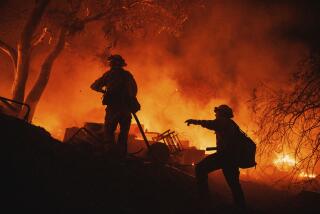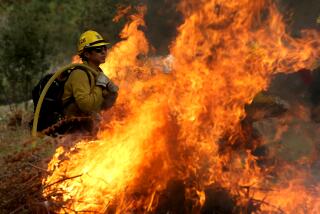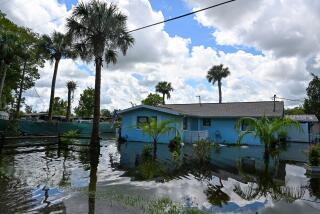Editorial: Wildfires are natural disasters, but Congress refuses to budget for them
In a year of extraordinary natural disasters from hurricanes to floods to wildfires, here’s another record-setter: Fiscal year 2017 was the U.S. Forest Service’s most expensive fire season yet. The cost of battling blaze after ever-bigger blaze across the country topped $2.4 billion.
Two decades ago, the cost of fighting fires only consumed about 15% of the Forest Service’s budget. But increased development in and around undeveloped open spaces, along with, paradoxically, decades of fire suppression, mean that wildfires are growing larger, more intense and more dangerous to communities. Many scientists believe the warming climate is exacerbating the situation.
As the cost of firefighting has gone up, the Forest Service budget has stayed relatively flat. The result is that fire suppression now consumes 55% of the agency’s annual budget, and some officials estimate that could grow to two-thirds in a few years.
Republican attacks on environmental rules threaten to torpedo the very real reforms needed for healthier forests.
The problem is this: The Forest Service ends up hoarding the money intended for other forest management programs — including fire prevention — because officials know they’re going to need it later in the year to fight fires. The agency has to shelve vital programs designed to reduce the threat of catastrophic blazes, such as thinning dense tree stands, controlled burns or insect control.
That makes no sense. It’s far more expensive to fight fires and to rebuild after fires than it is to prevent them — even before you take into account the terrible toll these mega-blazes have on life, property and the environment.
By comparison, the government provides emergency money from a federal disaster fund to communities ravaged by hurricanes, tornadoes and most other natural disasters.
The good news is that there is bipartisan agreement that the federal government has to fix the way it pays for fighting wildfires. There are proposals in Congress to allow the Forest Service to tap emergency funds when it exceeds its firefighting budget. So, in unusually bad years like 2017, the agency could get one-time funding to handle the need, rather than having to gut its forest health and prevention programs.
The bad news is that partisan, ideological battles have, so far, stymied the needed changes. Republicans, including several from California, are pushing for legislation that would tie the budget fix to “forest management” proposals that would allow for more commercial logging on public land while weakening environmental reviews and endangered species protections for such projects. This cynical attack on environmental rules threatens to torpedo the very real reforms needed for healthier forests.
California has a lot riding on the budget fix, especially in the Sierra, where drought and bark beetle infestations have killed more than 100 million trees since 2010, according to the Forest Service. Nearly a quarter of the trees have died in some areas, leaving vast swaths of orange and gray hillsides; the accumulation of dead fuel can cause fires to burn hotter and spread more easily. The Forest Service has tried to increase “ecological thinning,” which means cutting and removing some small and dead trees, and controlled burns to reduce the density of flammable material. But those are exactly the kinds of projects that are put on hold when the agency has to hoard money for firefighting.
Also, the state relies on the Forest Service for help in combating fires. The fires that raged through Northern California this fall were not on federal land, but the federal government sent 1,500 firefighters, along with air tankers, helicopters and water scoopers to help. State officials worry the ongoing budget crunch will weaken the Forest Service’s ability to assist in future fires.
Congress must move forward with the bipartisan Forest Service budget fix. The longer it waits, the more fire prevention projects are delayed and the threat of more catastrophic fires grows.
Follow the Opinion section on Twitter @latimesopinion and Facebook
More to Read
A cure for the common opinion
Get thought-provoking perspectives with our weekly newsletter.
You may occasionally receive promotional content from the Los Angeles Times.






